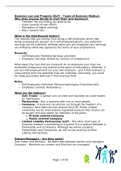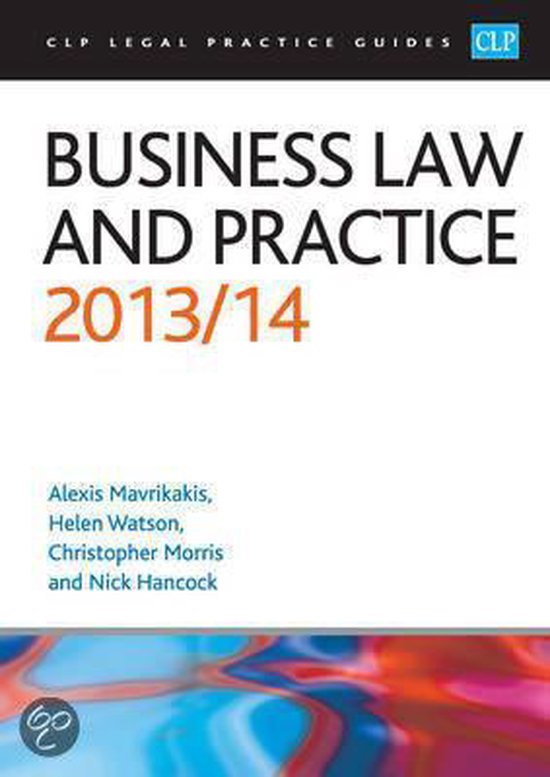Business Law and Property (BLP) – Types of Business Medium
Why does anyone decide to start their own business?
Freedom: No-one telling you what to do
Enjoy rewards of own efforts
Perception of higher earnings
Risk / reward ratio
What is the Risk/Reward Ration?
The rewards that you receive from being a self-employed rather than
being employed are greater. As a self-employed person, your potential
earnings can be unlimited, whereas when you are employed your earnings
are limited by what was agreed by the terms of your employment.
Rewards;
Self Employed: Potential earnings unlimited
Employee: Earnings limited by contract of employment
What about the risks that are involved? As an employee your risks are
extremely limited and only extend to the point of redundancy. Whereas, if
you are self-employed and run your own business – and if that business is
unsuccessful then the potential risks are unlimited. Ultimately, you could
be made personally bankrupt if that business fails!
Risks;
Self Employed: Unlimited. Personal bankruptcy if business fails
Employee: Limited. Redundancy
What are the Options?
Sole Trader – A person can run their own business as a sole trader;
by themselves
Partnership – Run a business with one or more people
Company – A business can also be run through the medium of a
company; here there are two choices PLC/LTD. Public Limited
companies are far more heavily regulated because their shares can
be bought and sold openly by members of the public.
Private Limited Company
Public Limited Company
Limited Liability Partnership (LLP) – The other main type of
business medium is something of a hybrid. It is a mixture between a
Partnership and a Company. Although we will be studying
Partnerships and Companies, we will not be covering Limited
Liability Partnerships.
Owners/Managers – Are they same?
Sole Trader and Partners – No distinction between owners and managers
Company – Members are owners and Directors are managers
Page 1 of 92
,If you decide to run your business, as a sole trader or by way of a
partnership – the owners and managers are the same. The sole trader is
the owner and the manger. The partners are the owners and the mangers
too! The situation is different if the business is run by was of a company.
That is the case, regardless if it is a Private Limited Company or a Public
Limited Company. The people who are sharing the profits of the business
are known as members/shareholders. The managers of the company who
are responsible for day to day running of the business are known as
directors. Whilst directors will probably receive a salary as an employee of
the company, they don’t necessarily share in the profits of that business.
It is possible, however, that someone could be a director of a company
and a shareholder as well.
What factors influence someone’s choice of business medium?
Creation
- How much will it cost to set up?
- Speed?
- Formalities to set up
Remuneration & taxation
Borrowing & security
First Factor; Creation
Commencing trading as a sole trader requires no formalities, hence can
be done very quickly and cheaply. Most traders will require an accountant
to prepare their business accounts (so this will be an added on-going
cost). There are no legal formalities required to create a Partnership
business either – a partnership is formed as soon as s.1 Partnership Act
1890 is fulfilled. It is always advisable to have a written partnership
agreement – so that the relationship between the partners is clear. Also,
the drafting of a partnership agreement will incur extra legal costs and will
take some time to do. In order to create a company – various documents
have to be filled at Companies House and fees also have to be paid. A
form IN01, Memorandum of Association and Article of Associations have to
be filled to Companies House. Registration of a company takes between 8-
10 days, although it is possible to pay extra for a same day registration.
The cost of registering a company change from one year to another.
Shelf Company – A company which is formed by someone else and you
can take over that. This can often be quicker and cheaper than forming a
new company. However, a shelf company would need to be adapted to
your own particular requirements i.e. changing its name and A of A, which
takes lots of time and money.
Second Factor; Remuneration & Taxation
Page 2 of 92
,What is very often the deciding factor when choosing a business medium
is how you will be payed and taxed in relation to that business?
Sole Trader/Partnership – The profits will be distributed to the
sole trader and partners. They will be liable to pay income tax and
or capital gains tax on those profits. Sole traders and partners will
also have to pay Class 2 and Class 4 national insurance
contributions
Company – the profits of the company will be liable to corporation
tax, which will be taxed at different rates depending on the profits
generated by the company. Also, the company will also have
employees – it will also need to pay Class 1 national insurance
contributions. Employees they will receive a salary which will be
taxed at source and shareholders will receive dividends for which
they will also have to pay tax on at the appropriate rate. As
employees, they will also have to pay Class 1 Primary National
Insurance contributions.
Third Factor; Borrowing & Security
How that business medium borrows money and grants security for any
loans taken?
Sole traders/Partners borrow money in the same way as an
individual. By taking a loan from the bank and granting security for
that loan often over any premises owned by the sole
trader/partnership
Company – A company can only borrow money if its Articles of
Association permit it to. In theory, they will allow this. A company
can grant a Fixed Charge over its fixed assets, but it also has the
ability to grant a Floating Charge over its other assets as well. A
floating charge is a charge over a class of assets which allows the
company to continue to deal with those assets, but which attaches
to those assets when the charge ultimately crystalises. The ability to
grant a floating charge is a significant feature and is only available
for companies.
What factors influence Choice?
Ongoing formalities involved in running that business medium
Privacy
Exit route
Management of that particular business
Personal liability
There are a few formalities involved by running a business as a sole
trader/partnership. However, sole traders and partners will prepare
accounts on annual basis and will complete tax returns. Sole traders and
partners can keep their business affairs private. The running of a
company, however, does require on-going formalities. Companies must
keep either statutory registers or provide on-going information for a public
registrar and they must seek a shareholder’s approval to certain changes
to the business i.e. changing its name or changing it’s Articles of
Page 3 of 92
, Association (A of A). Companies also have to make a considerable
amount of information public – file their account and make an annual
confirmation statement to the registrar of companies. Anyone can have
access to this information by doing a search at the companies register.
Lack of Privacy is the price that companies pay for limited liability.
What happens if someone wants to transfer their interest in a
business i.e. to exit it that business?
A Sole Trader can sell their business at any time but that will result
in the discontinuance of that business, although the assets and the
good will could be sold
Since Partnerships don’t have a separate legal personality,
whenever a partner leaves or joins that partnership – there is a
dissolution of the old partnership and the formation of a new one
which could be very costly. However, if there is a Partnership
Agreement in place this can provide for the remaining partners to
continue in partnership should one partner want to leave. The
remaining partners can take over the rest of the business, although
this will usually involve value in the out-going partner share of the
business and arranging for a payment of that share to be made.
If you are a shareholder in a company you can generally transfer
those shares freely, unless there are restrictions on transfers in the
company’s A of A. In a small private company, restrictions of share
transfers are usually very common e.g. giving the other
shareholders the first right to buy any shares that are transferred. If
a shareholder transfers their shares, this has no effect on the
existence of the company. A company has Perpetual Succession.
A company can be completely wound up or finished by a resolution
of its shareholders. There can sometimes be a distinction between
who owns a business and who is actually responsible for the daily
running. In a business, that is run as a sole trader, the sole trader
has full responsibility for managing a business and makes all of the
decisions with unrestricted contractual capacity. The sole trader is
flexible so the nature of the business can be changed quickly and
without any formalities. A sole trader acts in their own right,
although they can at any time to choose an agent to act in a
particular transaction. Unless the partners agree to contrary, the
management of a partnership is regulated by the Partnership Act
1890. Under that Act, each partner is entitled to take part in the
management of the partnership business. Partners also have
unrestricted contractual capacity, unless the partnership agreement
states otherwise. Each partner is an agent of the business which
combines the firm and the other partners. Unless the Partnership
Agreement states something else, any change in the nature of the
partnership business requires the unanimous approval of the
partnership under the PA 1890.
Page 4 of 92





